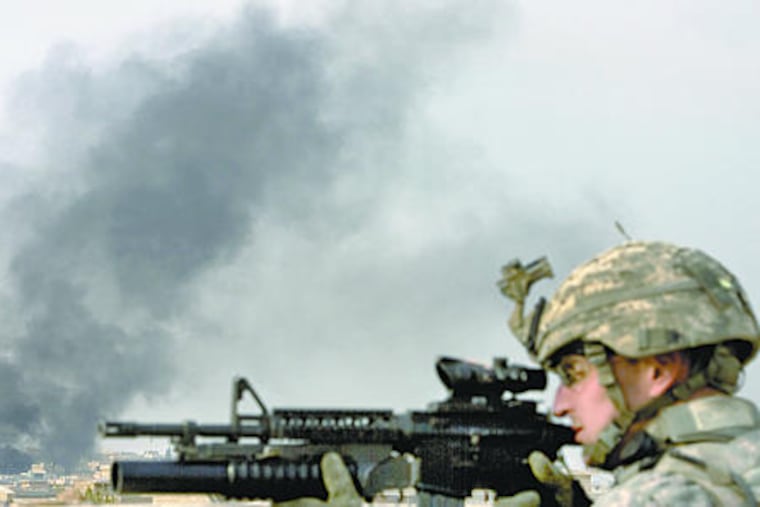An Iraqi quandary: How to fix Mosul
As violence has receded, other problems have lingered.

MOSUL, Iraq - It's a dirty, numbing, dangerous job in Iraq's deadliest city, and it pays a modest $500 a month. But when the police department recently advertised for college graduates to fill 200 traffic-policeman positions, it got 2,000 applications.
"Half of the terrorists would be defeated if we defeat unemployment," says police Gen. Khalid Soltan, citing the example of how desperately citizens scour for jobs.
As U.S. and Iraqi forces battle insurgents in the streets, Mosul faces economic and political problems that could pull apart Iraq's third-largest city even if the military campaign succeeds.
Fixing Mosul is a test of whether the Baghdad government can successfully grapple with potentially explosive forces lurking beneath a fragile stability.
The solutions offered seem straightforward enough - more jobs, good cops, and a generous dose of brotherly love. But the devil is in Mosul's wrenchingly complex catalog of woes:
A dozen Sunni insurgent groups alongside a spectrum of others. Hostility among the province's seven major groups and 26 tribes. Neglect, probably calculated, by the central government. Unemployment running more than 60 percent and electricity spluttering in for an average of four hours a day.
The city is al-Qaeda's last major urban stronghold in Iraq and a flashpoint along a dangerous Kurdish-Arab divide. Its local government is too paralyzed to kick-start the crucial economic engines.
"Mosul has been off the political map of Iraq," says Alexander Laskaris, a U.S. State Department official who heads the Provincial Reconstruction Team.
This, and more, five years after the U.S.-led invasion.
There is violence daily - from car bombs targeting police to masked gunmen slaying Christians - in this ancient, even graceful, city known as the "Pearl of the North." It is a place once famed for culture, learning and tolerance among ethnic and religious groups.
But more than 22,000 Iraqi and U.S. forces - "the Mosul surge" as troops call it - are blanketing the city of 1.8 million, and attacks are substantially down from several months ago.
U.S. commanders say the "security piece" is moving ahead, but the politics and economy of Mosul have failed to follow.
Much hope is pinned on elections expected by Jan. 31 for a provincial council, which is currently unrepresentative of the city and the surrounding Nineveh province and has failed to provide basic services.
With Sunni Arabs largely boycotting the January 2005 elections, 31 of 41 council seats were captured by the Kurds, who make up less than a third of the population, whereas the Sunnis account for some 60 percent.
This time around 517,000 registered to vote, one of the highest rates in the country, and there's no boycott in sight. But the outcome is unpredictable: Sunni political parties are splintering while the Kurds are putting forth a solid front.
Baghdad is doing its best to shape election results. Major army units in Mosul that were dominated by Kurdish soldiers and officers have been replaced by largely Sunni ones. U.S. commanders say some Sunni troops have been telling residents they had come to liberate their city from the Kurds.
"The city is like a game piece between the Kurds and the Iraqi government, and now it's a stalemate," says Maj. John Oliver, an operations officer in the Third Armored Cavalry Regiment from Fontana, Calif. "It's going to require a lot of reconciliation, and that's not happening yet."
If election results please the central government, development funds it had earlier withheld for political reasons could flow.
But unpredictable is the Kurdish reaction at a time of conflict between Baghdad and the Kurdish regional government over Kirkuk and other disputed territories, including towns around Mosul. The Kurds have semiautonomous control over three northern Iraq provinces.
A recent report by the International Crisis Group, which monitors conflicts around the world, warned that the Arab-Kurdish schism, with Mosul as one of its epicenters, arguably could exceed the Sunni-Shiite divide that spawned the 2005-2007 sectarian war.
The election "will tamp down some of the violence, but not all of it. There will still be al-Qaeda and the rejectionists," says Lt. Col. Robert Molinari, serving with the key U.S. military unit in Mosul. And there will still be the economy to set right, something U.S. planners say may take a generation.